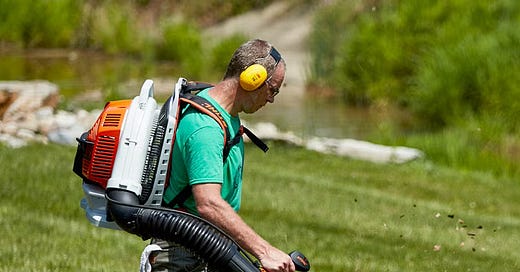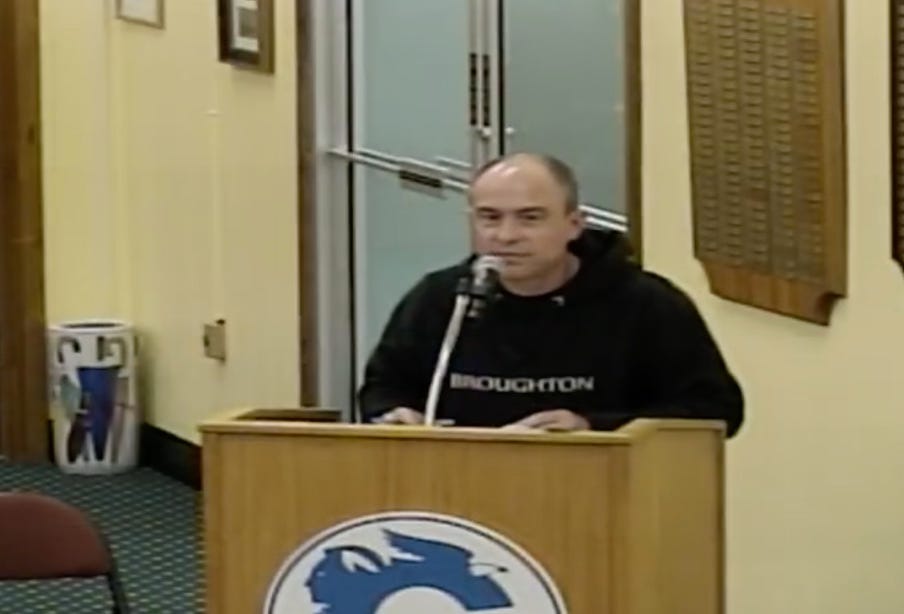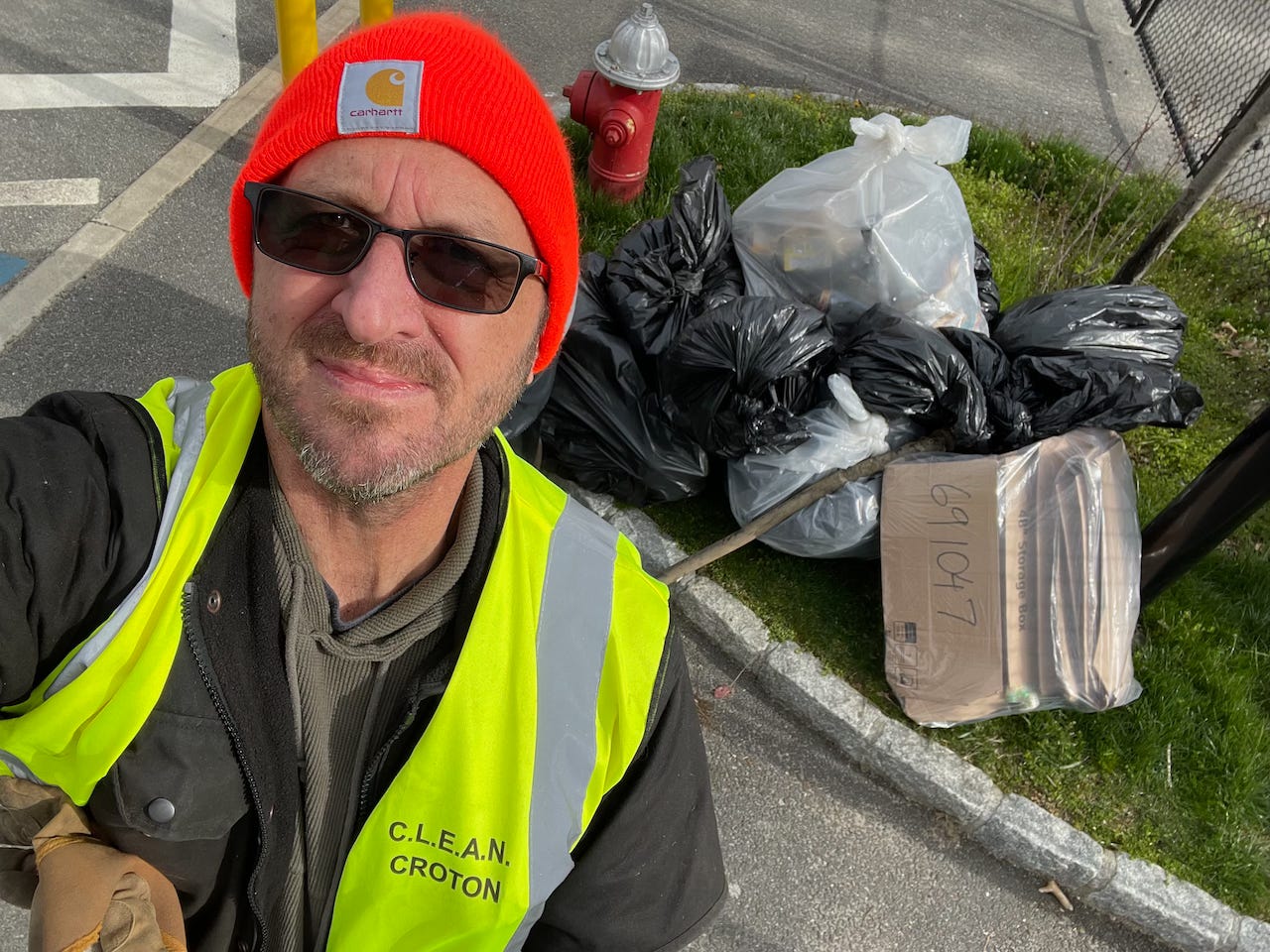Will Croton's gas powered leaf blower debate come roaring back? A partial commentary on a partial law.
A lack of serious enforcement has given new ammunition to those who want to revisit the on again, off again rules against these noisy and polluting machines.
Editor’s Note: During the year before the Chronicle began publishing in October 2023, its editor was a member of the Croton Conservation Advisory Council (CCAC) and involved in numerous discussions about the village’s leaf blower law.
In late 2023, shortly after The Croton Chronicle began publishing, we posted two fact-based commentaries about the village’s gas powered leaf blower law. We have to admit they were not our most popular articles. That’s probably because the village is “divided” on the issue, as they say. (How divided no one really knows, because there is no hard data on the subject, although each side claims to be in the majority.)
The first article, in November 2023, poetically entitled “The falling leaves, drift by the window... The autumn leaves, of red and gold...and roaring machines, begin to blow,” was embarrassingly long. That’s because it went into the detailed legislative history of the village’s partial ban, which finally took effect on June 1, 2022 after years of discussions that stretched back at least a decade.
The ban is only in effect half of the year, June 1 through August 31 and January 1 through March 31. However, as we wrote in that article, the law “has so many exceptions and exemptions one could drive a fleet of [highly polluting] Mack Trucks through it.” Thus the village, the school district, and the Hudson National Golf Club are exempt from its provisions, and enforcement has been spotty and, to paraphrase W. B. Yeats, “lacking all conviction.”
While some village trustees, such as Len Simon, hailed the law as a historic “compromise,” behind the scenes at the CCAC there was disappointment and consternation. The advisory body had proposed a law that would phase in a total ban of the gas powered devices over two or three years, allowing for public education on the health and environmental dangers of the machines and giving homeowners and landscapers time to transition to electric leaf blowers, or—even more radically—alternative approaches to leaves and debris including leaving them alone.
But that is not what the Board of Trustees passed. There were no phase-in provisions, and the new law appeared to lock in six months of allowable use, thus providing limited incentives for fundamental change. To make matters worse, at subsequent CCAC meetings, Mayor Brian Pugh made it pretty clear that he was not in favor of heavy handed enforcement. He may have been right to want to avoid setting neighbor against neighbor and our police against all, but the net effect was that enforcement was spotty and difficult for residents to bring about.
We all know the result. During the months when gas powered leaf blowers are supposedly banned, their ear splitting roar can still be heard in many places throughout the village.
So our ears perked up when, during the May 21 Board of Trustees meeting, a Croton resident identifying himself as “Dave” addressed the board during the non-agenda comments segment. (We know his full name but we will defer to his apparent desire for just a slight bit of privacy.) During his five minutes of speaking time, Dave spoke about gas powered leaf blowers.
Dave applauded the partial ban, but told the board that it might not be aware of the real life experiences of those who have to negotiate the law every day. “The level of frustration among citizens like me who see these ‘banned’ machines being used daily is beyond words,” he said. Dave went on to describe the difficult process he and others who call the village’s Code Enforcement office to complain must go through, including getting close enough to a contractor’s truck to get the name of the company.
“This is potentially very hostile,” Dave said. “I am put in a potentially dangerous situation because they are breaking the law.” And even if the village’s one code enforcement officer eventually gets to the scene, often the violators are already gone. Dave added that last year he called code enforcement 19 times.
“I ask you to make the ban permanent for everyone, with no exception,” he said, adding that “the government should lead by example.”
During the subsequent trustee reports segment of the board meeting, some trustees, and Village Manager Bryan Healy, took up the discussion. Trustee Cara Politi got the ball rolling, declaring her support for a “total ban” and stating that “clearly our [partial] ban is not working.”
Trustee Nora Nicholson followed up, telling the body that this issue was under discussion in CCAC (Nicholson is a trustee liaison to the council, along with Mayor Brian Pugh) and that enforcement was a definite issue—even her own lawn workers would sometimes show up and start using gas powered leaf blowers during the prohibited period, she said.
“We need to do a better job of communicating with the companies,” Nicholson added, as well as improving code enforcement. During his own report, Healy pointed out that staffing changes in the village would now allow more time for code enforcement. Len Simon, who had originally lauded the current law as a reasonable compromise, also added that it may be time to revisit the law.
We followed up with an email conversation with the chair of CCAC, John Ealer, who had a lot to say on the leaf blower issue.
“Gas powered leaf blowers are one of the worst things for the environment out there,” Ealer told us. “Not opinion. Fact.”
Ealer cited a long list of scientific studies concluding that the emissions from gas powered leaf blowers were bad for the climate and the environment. For example, one hour of operations of a top-selling leaf blower emits smog-forming pollution comparable to driving a 2016 Toyota Camry about 1100 miles, or about the distance from Los Angeles to Denver. A total of 15 million tons of CO2 are emitted each year from lawn maintenance activities in the United States.
On top of that, studies have shown that the noise from gas powered leaf blowers can lead to hearing loss, tinnitus, reduced cognitive performance, mental health issues, sleep disruption, heart disease, and hypertension.
Ealer told us that CCAC closely monitors what other municipalities are doing about leaf blowers, including White Plains, Larchmont, Irvington and other communities that have enacted total bans. “Our seasonal ban is currently in the middle of the pack, or slightly behind, the curve in Westchester,” Ealer says. “We’re not on the bleeding edge here.”
Since CCAC is an advisory body with no enforcement power itself, it has focused on education and enforcement of the law over the past few years.
“This year we have lobbied the BoT for improved enforcement for all the village conservation laws, including the upcoming new tree law, the village idling law, and the leaf blower ban.” At the CCAC’s May 13 meeting, for example, Mayor Pugh “agreed to have a representative of the Code Enforcement Department meet with the committee to discuss our enforcement concerns.”
Ealer acknowledges that enforcement is difficult with “intangible things like noise and air pollution. If you polluted your neighbor’s space by dumping a bag of trash on your neighbor’s lawn, they could easily prove you did it. Not so easy with air or noise, although the issue is very much analogous.”
And Ealer underscored a point which the Chronicle also emphasized in earlier commentary about this issue: The village must lead by example and not give scofflaws an excuse to violate the law by acting hypocritically.
“One factor impacting enforcement is the Village’s choice to exempt itself and its vendors from its own leaf blower law. While within its power to do so, of course, this kind of mixed message erodes overall support for this important initiative. Meaningful change requires, at some level, shared sacrifice. The Village ‘opting out’ erodes the sense of the commitment the community feels to this law, and undermines engagement.”
It’s hard to predict where the discussion of gas powered leaf blowers, enforcement of the partial ban, or even a new round of discussion of a year-round ban will lead us. One thing is sure, however: Anyone who thought this subject was closed will probably turn out to be wrong. We think they should be glad to be wrong. We only have one planet, and despite a lot of current pushback against environmental and climate change laws and initiatives, nothing will change what the science is telling us about the troubled future—or lack of it—of Planet Earth.
*********************************************************************************************************
To share this post, or to share The Croton Chronicle, please click on these links.
Comments policy: Please be polite and respectful at all times.







I long for the days of push mowers and rakes.
https://www.publicinterestnetwork.org/wp-content/uploads/2023/10/Lawn_Care_Goes_Electric_Oct23.pdf
"
Using a two-stroke engine is like heating your house with an open pit fire in the living room—and chopping down your trees to keep it going, and trying to whoosh away the fetid black smoke before your children are poisoned by it.
But these machines persist in American landscaping because they are cheap. And because—to be brutally honest—the people paying the greatest price in much of suburban American are the hired lawn-crew workers.
Those workers are convenient to hire, at the moment. But they are not likely to be in the neighborhood 10 or 15 years from now, when they are deafened, or have lung disease, or need other forms of care as the worst long-term health consequences kick in." Jim Fallows quote